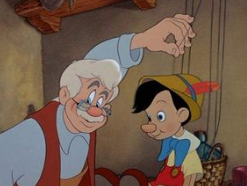- 阅读
- 阅读
- 技巧
- 百科
- 试题
- 文化
- 技能
Culture
文化板块
Back Story: Pinocchio, hero of our time
前传:当代英雄匹诺曹

Fun versus duty, autonomy and submission, innocence and experience: Carlo Collodi’s tale, first published in Italian in serial form in 1881, suggests many enduring themes and interpretations.
寻欢作乐还是担起责任、独立自主还是俯首听命、天真无邪还是久经考验:卡洛·科洛迪的故事于1881年首次以意大利语连载出版,呈现了许多经久不衰的主题和理解。
In the schmaltzy Disney take, when Pinocchio goes to Pleasure Island, supposedly a carefree paradise, it looks a lot like Disney World—an odd sort of marketing, given all the visitors are turned into donkeys.
而在迪士尼的矫情版本中,当皮诺曹去欢乐岛时,这个设定为如天堂一般无忧无虑的地方看起来和迪士尼世界没什么两样。这种营销方式真的很怪,因为所有的游客都变成了驴。
As Geppetto, the puppet’s old man, Mr Hanks sets sail in a small boat, a sequence that could be an out-take from “Cast Away”, a desert-island movie he made with the same director, Robert Zemeckis.
汉克斯饰演的老木匠杰佩托驾着一艘小船启航时,不知道的还以为这一幕是从他与该片导演罗伯特·泽米吉斯合作的荒岛电影《荒岛余生》中剪下来的。
Geppetto brings the goldfish along in a bowl.
杰佩托是把金鱼装在碗里带着的。
You half-fear he might eat it.
让人有点担心他会把这条鱼吃掉。
Mr del Toro’s spin is deeper and darker.
德尔·托罗的诠释更加深刻,也更黑暗。
Strange as it is to say of an animated film narrated by a cricket (voiced by Ewan McGregor), there is little magic here.
说来奇怪,在他这版由蟋蟀(伊万·麦格雷戈配音)进行讲述的动画电影中,几乎没有提到魔法。
In a revamp set in Mussolini’s Italy, Geppetto fashions the puppet in a drunken fit of grief for a child he lost in the first world war.
该片将故事背景改为墨索里尼统治下的意大利,杰佩托在第一次世界大战中失去了一个孩子,之后于借酒浇愁之际造出了匹诺曹。
Instead of cavorting on Pleasure Island, Pinocchio is conscripted into a Fascist boot-camp; in his mistreated purity he is likened to Jesus Christ.
匹诺曹没有像以往的版本一样在欢乐岛上尽情玩乐,而是被征召到了法西斯新兵营;他就好比耶稣基督,他的纯洁受到了折磨。
The distinguishing feature of a real boy, in this telling, is that he can die.
在这个版本中,“真正的男孩”的显著特征就是他会死。
If that sounds bleak, try Collodi’s original text.
如果这听起来很悲观,不妨试试科洛迪的原著。
Even by the standards of children’s classics, it is macabre.
即使以儿童经典作品的标准来看,它也令人毛骨悚然。
Almost the first thing Pinocchio does is kill the annoying cricket.
可以说,匹诺曹做的第一件事就是杀死那只讨厌的蟋蟀。
He is stabbed, hanged, burned and enlisted as a farmer’s guard-dog; bandit weasels offer him a kickback to let them steal chickens.
匹诺曹经历过刺伤、吊死、焚烧,还被征召为农民的看门狗;土匪黄鼠狼还给过他回扣,好让他们偷鸡。
His is a world of violence, random death, corruption, hunger and penury.
他的世界充斥着暴力、随机死亡、腐败、饥饿和贫穷。
“When poverty is truly poverty, everyone—even kids—understands it,” says a zingy new translation by Anna Kraczyna and John Hooper (who also writes for The Economist).
安娜·克拉齐纳和约翰·胡珀(后者也是《经济学人》的撰稿人)在一篇有吸引力的新译本中写道:“当贫困是真正的贫困时,每个人--甚至是孩子--都能理解。”
This delinquent Pinocchio is “a lazy bum”.
这版的不良匹诺曹是个“懒汉”。
Like many nagging offspring, he is both famished and a fussy eater.
他就像许多使人不得安宁的孩子一样,又饿又挑食。
Selfish and rude, he makes Geppetto miserable.
他既自私又粗鲁,让杰佩托痛苦不堪。
In a suitably modern revision, Mr del Toro’s moral lies less in what children do to parents than what parents’ strictures and expectations do to children.
在符合现代标准的修订版本中,德尔·托罗想传达的寓意与其说是孩子对父母的影响,不如说是父母的约束和期望对孩子的影响。
Defiance, as much as devotion, becomes the goal of Pinocchio’s odyssey.
反抗和忠诚一样,成为了匹诺曹艰险旅程的目标。
Always, though, the crux of the drama is found in the belly of the beast—the sea monster which, after all their rows and misadventures, swallows both Pinocchio and Geppetto.
然而,这部戏剧的关键部分总是在海怪的肚子那里——在匹诺曹和杰佩托经历了所有的争吵和不幸之后,海怪把他们二人吞入了腹中。
Their reunion in its entrails blends biblical imagery with Freudian fever dream.
他们在海怪内脏中的重逢,融合了圣经的意象和弗洛伊德式的狂热梦境。
It captures an eternal truth about troubled souls and their dearest, hardest relationships: sometimes you have to sink to the bottom before you can grasp your way back up.
它体现了一个永恒的真理,这个真理关乎陷入困境的灵魂和他们最宝贵、最坚固的关系:有时你必须沉沦到谷底,才能重新找到出路。
来源:VOA
参与评论